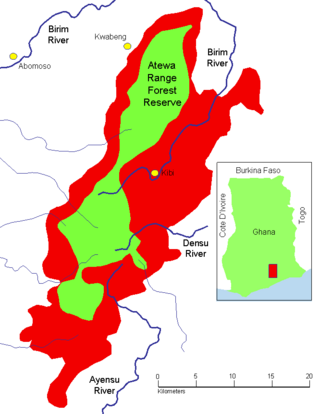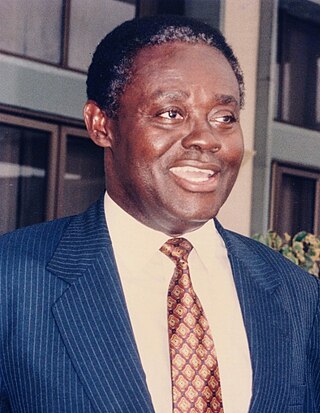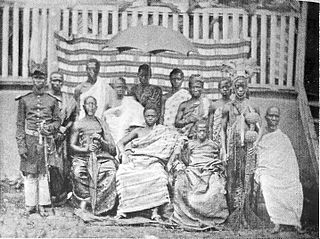
The Akyem are an Akan people. The term Akyem is used to describe a group of four states: Asante Akyem, Akyem Abuakwa, Akyem Kotoku and Akyem Bosome. These nations are located primarily in the eastern region in south Ghana. The term is also used to describe the general area where the Akyem ethnic group clusters. The Akyem ethnic group make up between 3-4 percent of Ghana's population depending on how one defines the group and are very prominent in all aspects of Ghanaian life. The Akyem are a matrilineal people. The history of this ethnic group is that of brave warriors who managed to create a thriving often influential and relatively independent state within modern-day Ghana. When one talks of Ghanaian history, there is often mention of The Big Six. These were six individuals who played a big role in the independence of Ghana. Of the big six, people of Akyem descent made up the majority.
Akyem Abuakwa is one of the four states of Akyem in 14th-century Africa. Currently, it is part of Ghana. Historically, the Akyem were part of the Adansi Kingdom, which was the first nation to build buildings out of mud. They were therefore named Adansi (builders). In the 18th century, the Ashanti Empire emerged, and under the leadership of King Osei Tutu, defeated the Adansi and annexed them into the Ashanti Empire. The three Akyem nations that were part of the Adansi Kingdom seceded and crossed the River Pra.

William Ofori Atta, popularly called "Paa Willie", was a Ghanaian founding member of the United Gold Coast Convention (UGCC) and one of the founding fathers of Ghana as one of "The Big Six" detained by the British colonial government in the then Gold Coast. He later became a Minister for Foreign Affairs in Ghana's second republic between 1971 and 1972.

Aaron Eugene Kofi Asante Ofori-Atta, was a Ghanaian educator, lawyer and politician who served as the fourth Speaker of the Parliament of Ghana.

Kibi or Kyebi is a town and the capital of the East Akim Municipal District, a district in the Eastern Region of south Ghana, on the eastern slopes of the Atewa Range. Kibi lies at an altitude of 318 m and, in 2013, had a population of 11,677 people.

The Atewa Range Forest Reserve is in the Akyem Abuakwa region of southeastern Ghana, near the town of Kibi, and south-west of the Kwahu Plateau which forms the south-west boundary of Lake Volta. The range runs roughly north–south, consisting of steep-sided hills with fairly flat summits. It is the last remains of the Cenozoic peneplain that once covered southern Ghana, and contains ancient bauxitic soils. The range is the site of an important forest reserve, and the source of three major rivers.

Nana Sir Ofori Atta I, KBE was the Okyenhene or King of the Akyem people and of Akyem Abuakwa, a traditional kingdom that stretches back to the thirteenth century and was one of the most influential kingdoms of the then Gold Coast Colony. He ruled from his election in 1912 until his death in 1943.
Nana Afia Dokuaa was the first and only woman to hold the office of ruler, or Okyenhene, in the history of Akyem Abuakwa in present-day Ghana. She ascended the Ofori stool in 1817 after her uncle Kofi Asante, and ruled until 1835.
The University College of Agriculture and Environmental Studies (UCAES) is a tertiary education initiative by the Akyem Abuakwa Traditional Council under the authority of the Okyenhene Amoatia Ofori Panin II (King of Akyem Abuakwa).

Ferdinand Ohene-Kena was a professional Mining Engineer and a political figure in the Republic of Ghana.
Ofori Panin Fie (Okyenhene's Palace) is the royal palace of the Omanhene of Akyem Abuakwa. It is located in Kyebi, in the Eastern Region of Ghana.

Ofori Panin Senior High School (OPASS) is a co-educational second cycle institution at Kukurantumi in the Eastern Region of Ghana. Ofori Panin School, is a co-educational boarding school located at Tafo in Akyem, Eastern Region, Ghana. The school was founded in 1961 by Kwame Nkrumah. The foundation stone of the building was laid on 19 May 1962 by Hon. Kofi Asante Ofori Attah, M.P. for Akim Abuakwa and Minister of Justice at that time. An alumnus/alumna of Ofori Panin is known as an "Opassian".
Amanokrom is a town in the Akuapim North District of the Eastern Region of Ghana. It shares border with Mamfe and Abotakyi
The Ofori-Atta family is composed of the bearers of an Akan language patronymic surname and their relatives. The family is of royal Akyem origins and has been active in business, politics, law and government in Ghana.
Nana Kuntunkunuku II was a traditional ruler in Ghana and Paramount Chief of Akyem-Abuakwa in the Eastern Region. His official title was Okyehene - King of Akyem. He succeeded his uncle, Ofori Atta III, and ruled the Akyems for 23 years. He was succeeded by Amoatia Ofori Panin II. He was the seventh president of the National House of Chiefs and served from 1998 till his death in 1999.
Robert Yaw Addo Fening is a Ghanaian historian who has made major contributions in documenting the history of Akyem Abuakwa and of Ghana. He has been accorded the award of Okyeman Kanea in recognition of his historical works. For several years he taught at the University of Ghana.

Nana Amoako Atta I,, was the paramount chief of Akyem Abuakwa in nineteenth century southern Ghana. Locally, his position is known as the Okyehene or Omanhene. He ruled the traditional kingdom from July 1866 to 1880 and from 1885 to 1887. After the Sagrenti War of 1874, the British declared Akyem Abuakwa a colonial possession, legally called a ‘protectorate’, as part of the Gold Coast. This development led to a clash between the old traditional Akan culture and the imposition of the new Western Christian political order.
Osagyefuo Amoatia Ofori Panin is the 35th Chief of Akyem Abuakwa, also called Okyeman in the Eastern Region of Ghana. He took his seat on October 4, 1999, succeeding his brother, Osagyefo Kuntukunuku. October 2019 marked 20 years of his reign, which was celebrated in a glamorous style.
Nana Dokua was the queen mother of Akyem Abuakwa. She was the one who welcomed the King of the Dwabens called Nana Kwaku Boateng and his army. A civil war broke out between the Ashantis and the Dwabens in 1832, six years after the battle of Akatamansu. In 1824, during her regime, she also provided refuge for the Kotokus who had also assisted Abuakwa in some wars against the Ashantis. During her reign, part of the Juabens revolted against the Ashantis. Nana Kwaku Boateng was the leader of the rebels who was their chief. They were forced to leave Juaben in Ashanti for the south.
Nana Ofori Atta II was the paramount king of Akyem Abuakwa. He lived from 1899 to 1973. He succeeded Nana Sir Ofori Atta I. He was also the successor who was once a member of the Executive Council.









